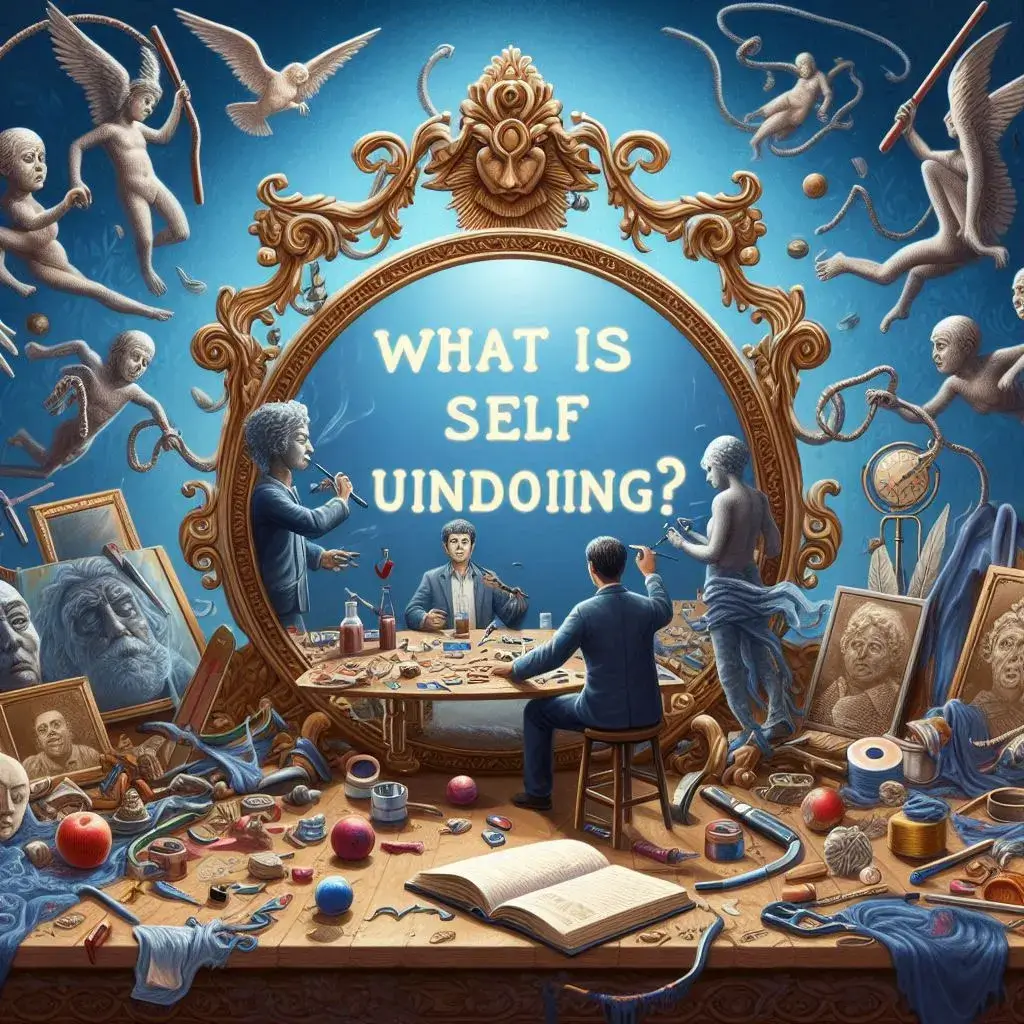Ever been stuck in the loop of waiting for the green light from others before you make a move? Feeling like you can’t drop your own thoughts without a nod of approval? Trust me, you’re not riding solo on this struggle. In this question “Why Can’t I Think For Myself?” Positive self concept and negitive self concept is play a crucial role.
So, In this article, we’ll explore some reasons why this may be happening and how you can change your self concept for start taking steps towards becoming more independent in your thinking.
Table of Contents
Toggle5 Reasons : Why Can’t I Think For Myself?

The Fear of Judgement
One of the most common reason is many people are afraid of being judged or criticized for their beliefs and opinions, so they conform to the views of others. This fear can be especially strong in situations where there is a perceived power imbalance, such as in the workplace or in social situations where there is a dominant group. This can lead to a self-perpetuating cycle of conformity, where individuals suppress their own views in order to fit in and avoid negative judgement.
[blockquote align=”none” author=”Saul Alinsky“]The greatest enemy of individual freedom is the individual himself. [/blockquote]
According to a study published in the Journal of Personality and Social Psychology, people are more likely to conform to the opinions of others when they perceive themselves to be in a position of low power or status. This can be especially true in situations where we feel like we don’t have the expertise or knowledge to make an informed decision.
The Influence of Others
One of the primary reasons why people struggle to think for themselves is the influence of others. This influence can come from various sources such as family, friends, peers, society, culture, and the media.
A study published in the Journal of Experimental Social Psychology found that people are more likely to conform to the opinions of others when they perceive themselves to be in a group setting. This can be especially true in online forums or social media, where it’s easy to feel like we’re part of a larger community.
Here are some ways in which the influence of others can affect our ability to think for ourselves:
Conformity
People often conform to the opinions and behaviors of others to fit in and avoid social rejection. This can be especially true in group settings where there is a clear majority opinion. Conformity can lead to a lack of critical thinking and an overreliance on the opinions of others.
<script type=”text/javascript”> atOptions = { ‘key’ : ‘b4898b819d54d628620553327667c544’, ‘format’ : ‘iframe’, ‘height’ : 90, ‘width’ : 728, ‘params’ : {} }; </script> <script type=”text/javascript” src=”//www.topcreativeformat.com/b4898b819d54d628620553327667c544/invoke.js”></script>
According to a study published in the Journal of Personality and Social Psychology, people are more likely to conform to the opinions of others when they are uncertain or lack confidence in their own beliefs. This can make it difficult to think for ourselves and make decisions that align with our own values and beliefs.
Peer Pressure
Peer pressure can be a strong force that influences our decisions and behavior. This pressure can come from friends, classmates, or colleagues who encourage us to conform to their expectations or engage in certain activities. Peer pressure can make it difficult to think for ourselves and make decisions that align with our own values and beliefs.
According to a study published in the Journal of Adolescent Health, peer pressure is a significant factor in adolescent risk-taking behavior, including substance use and delinquency.
Social Norms
Social norms are the unwritten rules that govern behavior in a particular society or culture. These norms can shape our beliefs, attitudes, and behavior, often without us realizing it. Social norms can make it difficult to think for ourselves and question the status quo. For example, if everyone in a particular culture believes that a certain behavior is acceptable, it can be difficult for an individual to challenge that belief, even if they disagree with it. According to a study published in the Journal of Personality and Social Psychology, exposure to social norms can lead to a decrease in creativity and independent thinking.
[blockquote align=”none” author=”Eleanor Roosevelt“]Care about what other people think and you will always be their prisoner.[/blockquote]
Media Influence
The media can also have a significant impact on our ability to think for ourselves. This can include news, entertainment, and advertising. The media can shape our beliefs, attitudes, and values, often without us realizing it.
For example, exposure to violent media can desensitize individuals to violence and make it more difficult to empathize with others. According to a study published in the Journal of Communication, exposure to media messages that promote unrealistic beauty standards can lead to body dissatisfaction and low self-esteem.
Cultural Expectations
Cultural expectations can also influence our ability to think for ourselves. These expectations can come from our family, community, or society at large.
For example, in some cultures, there is an expectation that individuals will conform to traditional gender roles or follow certain religious practices. These expectations can make it difficult to think for ourselves and question cultural norms.
According to a study published in the Journal of Cross-Cultural Psychology, individuals who are high in cultural tightness (i.e., adherence to cultural norms and expectations) are less likely to engage in creative thinking.
Lack of knowledge
With my experience, I confidently say that the main cause of why people can’t think for themselves is when they lack knowledge or expertise in a particular area. This can lead to a reliance on others who are perceived to be more knowledgeable or experienced.
A study published in the Journal of Personality and Social Psychology found that individuals are more likely to conform to the opinions of others when they perceive themselves to be in a situation where they lack expertise. This can be especially true in situations where there is a lot of uncertainty or ambiguity.
Lack of self-confidence
When individuals lack confidence in their own abilities, they may rely on others to make decisions for them. This can be especially true in situations where they feel uncertain or lack expertise.
A study published in the Journal of Personality and Social Psychology found that people who lack self-confidence are more likely to conform to the opinions of others. This can lead to a vicious cycle of dependence, where individuals become increasingly reliant on others for guidance and validation.
Fear of isolation
Humans are social creatures, and the fear of being ostracized or excluded from a group can be a powerful motivator to conform. According to research published in the Journal of Experimental Social Psychology, people are more likely to conform to a group’s opinions when they perceive themselves to be in a situation where they could be rejected by the group. This can be especially true in situations where there is a strong group identity or where the group holds a lot of power.
Overcoming : Changing The Perspective Of Thinking

Fear of Judgment: Breaking the Chains
Fear of judgment be holdin’ people back from thinkin’ for themselves, It’s like, they be worried about what others gonna think ’bout their ideas and all. But the real deal is, everyone got their own thoughts and opinions, and that’s straight up valid, bro.
According to a study in the Journal of Personality and Social Psychology, fear of negative evaluation can lead to self-censorship and a lack of creativity (Mueller, Melwani, & Goncalo, 2012).
[blockquote align=”none” author=”Eleanor Roosevelt“]No one can make you feel inferior without your consent.[/blockquote]
Here’s a short exercise to help you overcome that fear of judgment and start thinkin’ for yourself, fam:
Write down your thoughts and opinions on a topic that you feel passionate about. Don’t hold back, just let it all out.
Share your thoughts with a trusted homie or family member, and ask for their feedback. Don’t be afraid to hear what they gotta say, even if it ain’t what you wanna hear.
Reflect on their feedback, and consider how it might inform or change your perspective. You might learn something new, or you might decide that your original thoughts are still the way to go. Either way, it’s all good.
Repeat this exercise with different topics and people, gradually working your way up to more challenging situations. Before you know it, you’ll be thinkin’ for yourself like a pro. Boom! 💥
Overcoming the Influence: Mastering Your Own Mind
The influence of others can have a significant impact on our thoughts, beliefs, and behaviors (Cialdini & Goldstein, 2004). This is because we are social creatures who naturally seek out the approval and acceptance of others. However, this influence can sometimes prevent us from thinking for ourselves and making decisions based on our own values and goals.
Identify a decision that you need to make, and write down the different options that are available to you.
Take some time to reflect on your own values and goals, and consider how each option aligns with them.
Seek out the perspectives and opinions of others, but make sure to consider them objectively and critically.
Make a decision based on what is best for you, rather than what others may expect or want.
Reflect on the decision-making process, and consider how you can apply these skills to other areas of your life.
Building Unshakable Confidence
Lack of self-confidence can be a major obstacle to thinking for oneself (Bandura, 1977).
To help you build up that self-confidence and start thinkin’ for yourself, try this steps:
Make a list of your strengths and accomplishments. This can include anything from personal achievements to positive qualities that others have recognized in you.
Set a small, achievable goal for yourself. This can be something that you have been wanting to do, but have been hesitant to try because of a lack of confidence.
Break the goal down into smaller tasks, and create a plan for achieving it.
Engage in activities that build your self-esteem and confidence. This can include practicing a new skill, volunteering, or engaging in physical activity.
Practice positive self-talk. Whenever you start to doubt yourself, remind yourself of your strengths and accomplishments, and focus on the progress you have made towards your goal. You got this, fam!
Conquering the Lack of Knowledge
lack of knowledge can be a real roadblock. It’s like, you want to have your own opinions and all, but you don’t know enough about the topic to make an informed decision. That’s where doin’ your research comes in!
To help build your knowledge and think more critically, try this exercise:
Choose a topic that you are interested in but don’t know much about.
Conduct research on the topic, using a variety of sources such as books, articles, and research studies.
As you read, take notes on the key points and arguments presented.
Evaluate the credibility and reliability of the sources you are using.
Engage in critical thinking by questioning assumptions and analyzing the evidence presented.
Form your own opinion on the topic, based on the information you have gathered.
Overcoming the Fear of Isolation
Fear of isolation can be a powerful motivator for conforming to the beliefs and opinions of others. This fear can cause individuals to suppress their own thoughts and feelings. To overcome a fear of isolation, it’s important to cultivate a strong sense of self-worth and to seek out supportive relationships.
Exercise: To help build your confidence and overcome a fear of isolation, try this exercise:
Identify your values and beliefs, and write them down.
Practice expressing your opinions and ideas in a clear and respectful manner. This can be with friends, family, or in a public setting.
Seek out supportive relationships with individuals who share your values and beliefs.
Practice assertiveness by setting boundaries and standing up for yourself when necessary.
Remember that it’s okay to be different and that diversity is a strength!
Reference
Paul, R., & Elder, L. (2008). The miniature guide to critical thinking: Concepts and tools. Foundation for Critical Thinking.
Bandura, A. (1977). Self-efficacy: Toward a unifying theory of behavioral change. Psychological Review, 84(2), 191-215.
Cialdini, R. B., & Goldstein, N. J. (2004). Social influence: Compliance and conformity. Annual Review of Psychology, 55, 591-621.



